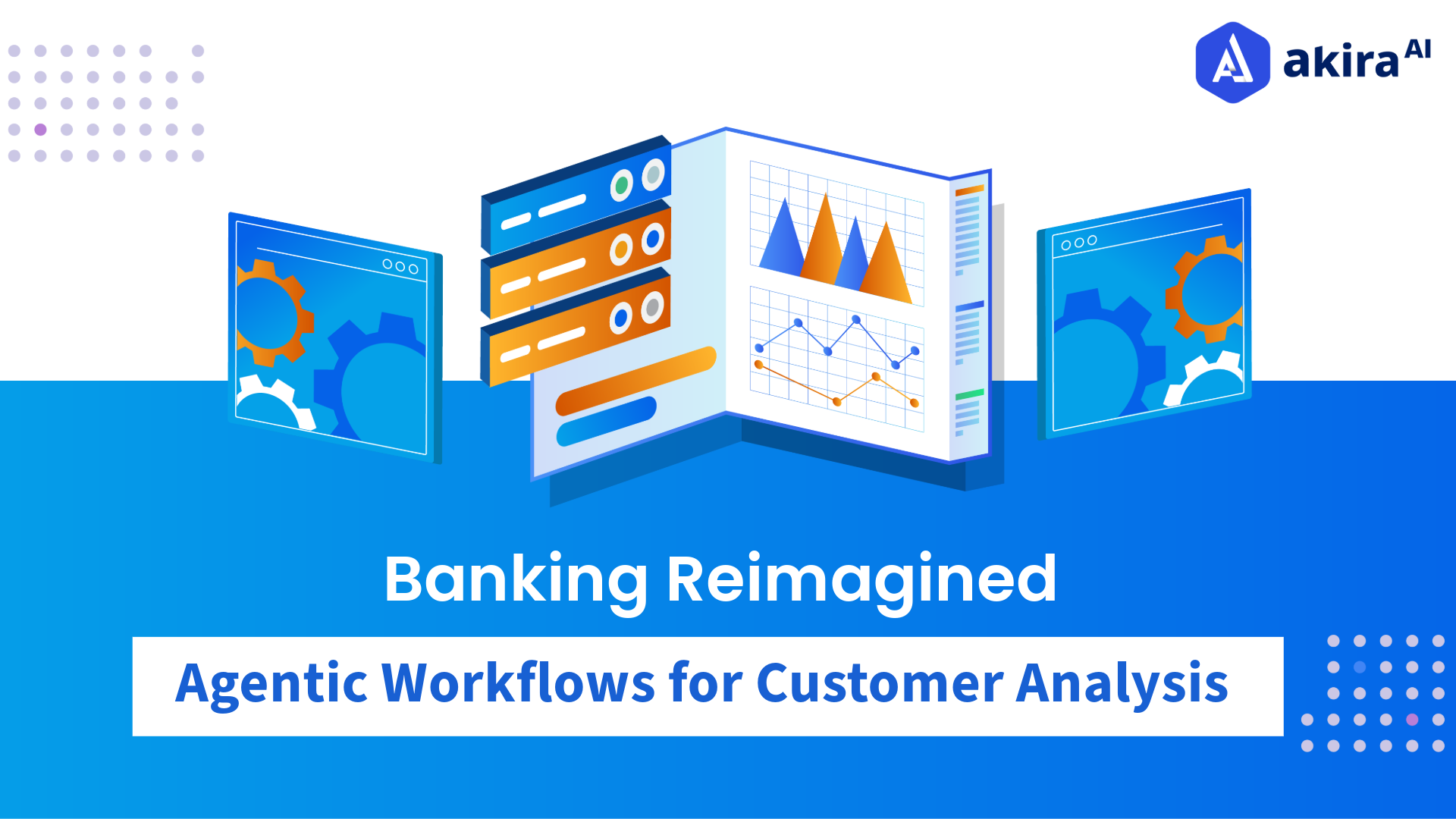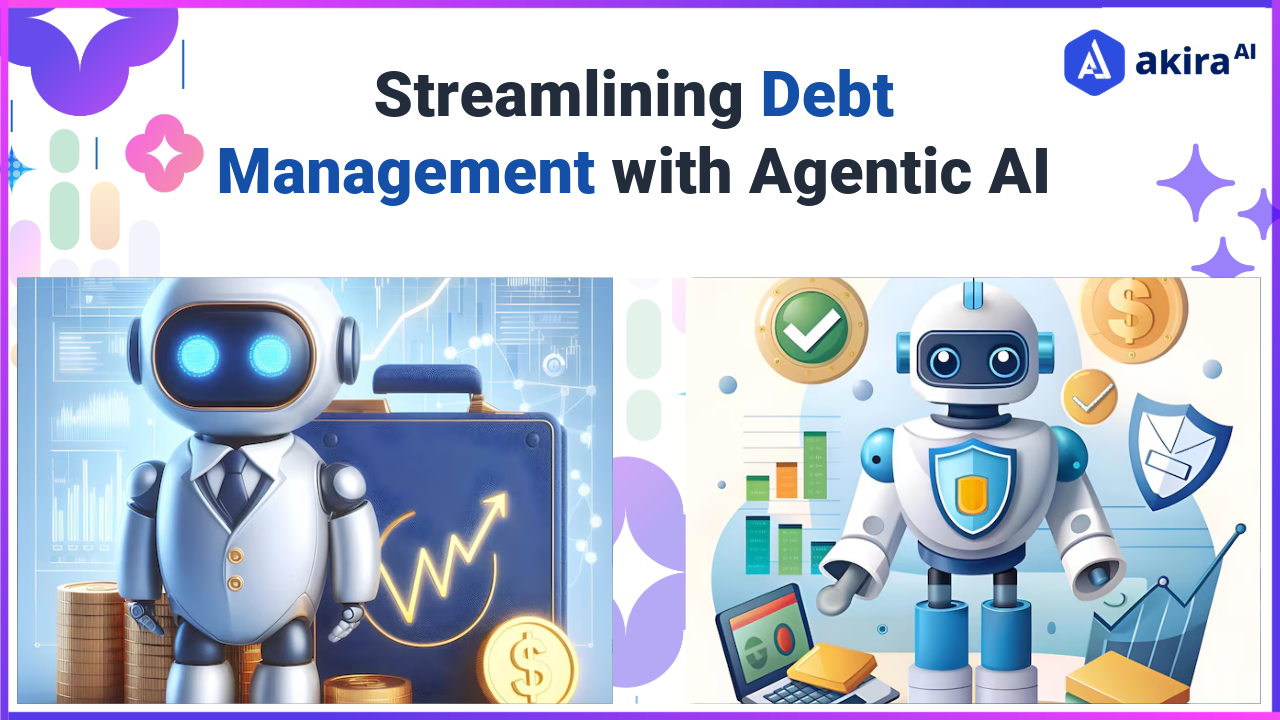There is more opportunity for upselling and cross-selling in banking than in any other industry, but few organizations seize it. This means that traditional sales techniques are commonly assumed to entail passive selling, where the salesperson waits for customers to show some level of interest first. AI Agents assist in turning this environment into a more positive one by identifying customer information and behavior to recommend products to them. It is a proactive strategy that increases client satisfaction and generates considerable increases in revenues for financial companies.
In this blog, we will venture into the depths of up-selling and cross-selling opportunities and discuss how beneficial AI agents can be in these fields.
What are Upsell and Cross-sell Opportunities?
Upselling and cross-selling are essential strategies banks employ to deepen customer relationships and enhance revenue streams. Upselling refers to encouraging customers to purchase a more premium version of a product they are already considering. For example, a bank might suggest a premium credit card that offers enhanced rewards and benefits, such as cashback or travel perks, to a customer initially interested in a basic card.
Conversely, cross-selling involves offering customers additional products that complement their existing services. For instance, if a customer has recently opened a savings account, the bank may present options for a checking account or investment products, thereby broadening the customer's relationship with the institution. Both strategies are designed to increase customer satisfaction and loyalty by providing tailored solutions that meet their financial needs, benefiting the bank's bottom line.
A Brief Overview of Upsell and Cross-sell Opportunities in Banking
Due to the broad range of financial products, the banking industry is ripe with opportunities to sell more complex and varied services to consumers. In addition to credit cards and savings accounts, banks provide home loans, investment products, insurance plans, and financial advisory services. Data analysis can help banks determine existing clients that may improve a bank's options or products, maximizing their value. For example, by analyzing a customer's financial history and transaction patterns, a bank can identify eligible individuals for a home equity loan, enabling the institution to present this option as an upsell. Similarly, banks can use transaction data to target cross-selling efforts, such as offering investment options to customers with significant savings. This targeted approach improves conversion rates and enhances customer satisfaction by providing solutions that meet client needs.
Traditional Vs. Agentic AI-Based Up-Sell and Cross-Sell Opportunities
|
Aspect |
Traditional Upsell and Cross-sell Opportunities |
Agentic AI-Based Upsell and Cross-sell Opportunities |
|
Approach |
Reactive; waits for customer interest |
Proactive; analyzes customer data for tailored offers |
|
Customer Insights |
Limited understanding; relies on manual data review |
Deep insights through AI analytics and behavior tracking |
|
Personalization |
Generic offers; one-size-fits-all approach |
Highly personalized recommendations based on individual needs |
|
Efficiency |
Time-consuming; often involves manual processes |
Automated; speeds up the identification and delivery of offers |
|
Scalability |
Hard to scale; dependent on human sales teams |
Easily scalable; can handle vast amounts of customer data |
|
Feedback Loop |
Slow; relies on post-sale analysis |
Real-time adjustments based on customer interactions |
|
Sales Strategy |
Focused on immediate sales; short-term thinking |
Long-term relationship building; focuses on customer lifecycle |
|
Technology Utilization |
Minimal use of technology; often outdated tools |
Leverages advanced AI technologies for continuous improvement |
|
Results Tracking |
Limited metrics and slow reporting |
Comprehensive metrics with real-time tracking and analytics |
|
Customer Engagement |
Often feels pushy; may alienate customers |
Enhances engagement through relevant, timely suggestions |
How Do AI Agents Facilitate Up-sell and Cross-sell Opportunities?

Fig 1:AI Agents Facilitate Up-sell And Cross-sell Opportunities
AI agents are pivotal in transforming how banks identify and capitalize on upsell and cross-sell opportunities. Their key functionalities include:
-
Data Analysis: AI agents can analyze vast customer data to identify patterns and preferences that inform targeted offerings. Banks can better understand customer behaviors and present relevant products by assessing variables such as transaction history, account activity, and demographic information.
-
Predictive Analytics: These agents can make predictions using past data to estimate a customer's needs and actions in the near future. This capability allows banks to proactively present relevant products and services to customers.
-
Real-Time Recommendations: The Agentic AI exists in the background, offering real-time advice to the customer care representative, either in an online or face-to-face consultation. It makes certain that consumers are offered what they can use at a specific time, which helps to boost their interest and hence promotes the feeling of being valued.
-
Customer Segmentation: These agents help segment customers with high levels of sophistication by partitioning them based on their activity level, choice, and wealth status. This level of segmentation enables the banks to develop effective marketing strategies, enabling the intensity level to enhance their upsell and cross-sell programs.
-
Feedback Loops: AI agents are always learning from the customer so they can make better recommendations that gradually improve. This adaptive learning brings better accuracy and targeting of these messages, increasing customer engagement and achieving higher conversion rates.
-
Campaign Optimization: This multi-agent system is capable of providing real-time analysis of the effectiveness of the marketing campaigns and, therefore, assisting the banks in quickly adapting to the outcome. This ability makes sure that, somehow, in some form or another, marketing is correct or pertinent.
How Does Akira AI Optimize Up-sell and Cross-sell Opportunities?
Akira AI employs a sophisticated suite of agents designed to optimize upsell and cross-sell opportunities effectively. The following are the types of agents utilized by Akira AI:
-
Customer Insight Agents
These agents are responsible for analyzing customer data to extract actionable insights, helping banks understand client needs and preferences. By evaluating various data points, including transaction history and engagement levels, these agents can identify opportunities for additional services.
-
Behavioral Analysis Agents
These agents monitor customer interactions to detect patterns that indicate readiness for upsell or cross-sell opportunities. By analyzing behavior over time, they can predict which clients are likely to respond positively to specific offers.
-
Recommendation Engine Agents
Utilizing advanced algorithms, these agents generate personalized product recommendations based on individual customer profiles and behaviors. That way, they can make suitable offers based on previous purchases and other customers' preferences that are also likely going to be interested in the advertised items.
-
Feedback Loop Agents
Such agents use information from customer relations to fine-tune the recommendations and make the subsequent offers as accurate as possible. This process of integration of real-time data ensures that recommendations made are dynamic to the ever-changing customer needs and tastes.
-
Campaign Management Agents
These agents oversee the delivery of some marketing campaigns and the distribution of certain types of offers at certain intervals. This automation further enhances the functionality of a campaign and results in better conversion levels.
Use Cases of AI Agents in Up-sell and Cross-sell Opportunities
 Fig 2: Use Cases of AI Agents in Up-sell and Cross-sell Opportunities
Fig 2: Use Cases of AI Agents in Up-sell and Cross-sell Opportunities
AI agents can be applied in various scenarios within the banking sector, demonstrating their versatility and effectiveness:
-
Credit Card Upsell: An existing credit card holder is identified as eligible for a premium card. An AI agent automatically generates a personalized offer highlighting benefits aligned with the customer's spending habits. This targeted approach can significantly increase the likelihood of acceptance, leading to improved customer satisfaction and higher revenue.
-
Mortgage Cross-sell: A customer who recently opened a savings account receives an automated notification about competitive mortgage rates. The AI agent crafts a tailored message based on the customer's financial history, encouraging them to consider mortgage options that align with their financial goals.
-
Investment Products: Clients interested in particular industries may get real-time recommendations for mutual funds investing in such sectors. By monitoring market trends and the customer's behavior, they can provide offers at the appropriate time; thus, clients can invest by meeting their goals on time.
-
Personal Finance Management: These agents can look for spending habits to correctly advise which instruments to use based on customer preferences for selling other necessary tools and accounts. Banks can also increase customer satisfaction by offering their customers elements that will help them to control their spending.
-
Insurance Upsell: People seeking home loans might be subjected to an offer of the homeowners' insurance policy. These agents can choose what characteristics the customer should have and design an inviting offer through which the customer will be compelled to get a wider area range and hence have a higher rate of conversion.
-
Bundled Products: Such agents can be used by banks to offer several financial products at a lower price than when the products are sold individually. For instance, a client seeking personal credit will be offered a package containing a checking account and insurance policy, thus increasing the attractiveness of the offer.
Operational Benefits of AI Agents in Upsell and Cross-sell Opportunities
The integration of AI agents into the banking sector offers several operational advantages:
-
Increased Efficiency: By automating data analysis and customer interactions, banks can operate more efficiently, freeing up human resources for higher-value tasks. This efficiency enables staff to focus on building relationships with clients rather than getting bogged down in manual processes.
-
Enhanced Accuracy: AI agents minimize the risk of human error in data analysis and decision-making. Their reliance on data-driven insights ensures that offers are tailored accurately to customer needs, improving overall effectiveness.
-
Scalability: AI agents can easily scale to accommodate growing customer bases without compromising service quality. As banks expand their reach, these agents can continue to deliver personalized recommendations and insights.
-
Cost Savings: By automatizing numerous processes and avoiding manual work done by employees, these agents can minimize the company's expenses. By automating a large number of routine tasks, banks are able to properly allocate the resources in the best way possible.
-
Improved Customer Insights: The deep learning capabilities of AI agents make possible a sophisticated analysis of customer behaviors and tendencies. The knowledge means that the banks are able to predict some of these needs in advance whereby they can satisfy their customers hence improving their satisfaction levels.
-
Real-Time Adaptability: Through the use of AI agents, banks are in a position to serve their customers and change direction if the market changes or customers' demands shift. This ability is helpful in an environment where the firm is not fully aware of the type of financial environment it faces.
Technologies Transforming Up-sell and Cross-sell Opportunities in Banking
AI agent technologies are revolutionizing how banks approach upsell and cross-sell opportunities. Here are some of the key technologies at play:
-
Machine Learning: This technology allows agents to work with a vast amount of information, find trends, and make a prognosis of customers' actions. This way, various recommendations can be made according to the specified customer profile.
-
Natural Language Processing (NLP): These agents are able to decipher and analyze the customer's message, whether through chat, mail, or social media. This capability improves customer service delivery since it shall deliver apt recommendations based on the context.
-
Predictive Analytics: Using historical data helps agents forecast future customer needs and behaviors. This technology allows banks to proactively engage with customers, presenting relevant offers that align with their financial goals.
-
Robotic Process Automation (RPA): RPA comprises elements of a predetermined process, which can be data entries, reports, or any other routine task. This efficiency helps to free up the time that banks can devote to more important, core activities that include customer initiatives as well as product innovation.
-
Recommendation Algorithms: These algorithms analyze customer data to generate personalized product recommendations. By understanding individual preferences, banks can present tailored offers that resonate with customers.
Future Trends in AI Agents for Up-sell and Cross-sell Opportunities
As technology continues to advance, several trends are likely to shape the future of AI agents in banking:
-
Increased Personalization: With the growing availability of data, such agents will become even more adept at providing personalized recommendations tailored to individual customer preferences. This trend will enhance customer satisfaction and loyalty.
-
Enhanced Data Security: As banks increasingly rely on these agents, ensuring data security and privacy will become paramount. Future developments will likely focus on improving security measures to protect sensitive customer information.
-
Integration with Other Technologies: Such agents will extend their uses of blockchain, IoT, and other evolving technologies to deliver better solutions. These connections will generate opportunities for deeper improvements of the customer experiences as well as of the operational processes.
-
Real-Time Decision Making: In the future, one can envision such agents having the ability to make decisions on the fly with respect to changes in customers' needs and/or the market. This ability will help the banks quickly address the clients' requests and seize new opportunities.
-
Ethical AI: With the increasing implementation of AI, new questions related to the ethical use of algorithms will be raised. In order to prevent the unfair use of AI agents across the banking industry, rules should be set that will guarantee their transparent work and create trust with customers.
Conclusion: AI Agents in Banking
The journey toward effective up-selling and cross-selling in banking is rapidly evolving, fueled by the transformative power of AI. As financial institutions harness AI agent's capabilities, they streamline their processes and create more meaningful and personalized interactions with customers. These intelligent systems analyze data to understand customer preferences, enabling banks to offer tailored solutions that meet individual needs. By embracing this technology, banks can unlock new opportunities for revenue growth and solidify their positions as trusted partners in their customers' financial journeys. Such an evolution helps develop higher satisfaction among customers and creates the right conditions for a more extended period of strategic victories in a competitive environment.
Explore More The Future of Customer Churn Prediction: AI Agents in Banking
Read More About Elevating Banking Insights: Agentic AI for Competitor Analysis


